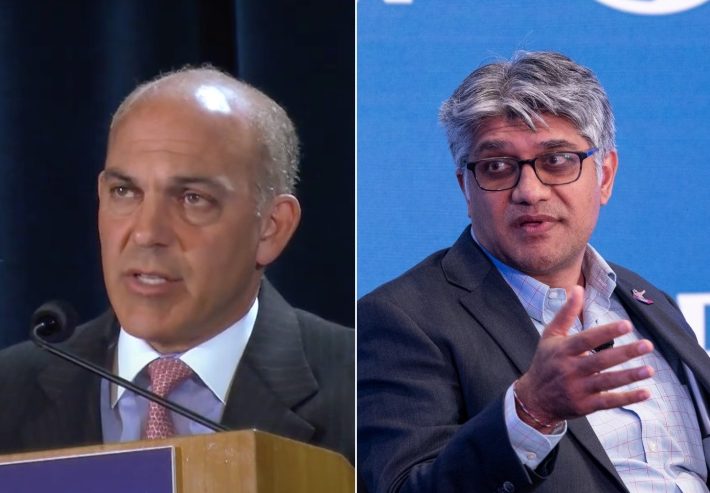Jigar Shah and Jonathan Silver, two scandal-plagued Democratic officials with histories of questionable projects and failed loans, are offering their expertise in exchange for ‘modest equity stakes’

They doled out billions in federal loans to green energy companies, some of which failed spectacularly or led to congressional investigations. Now President Biden’s and President Obama’s energy loan czars—Jigar Shah and Jonathan Silver—are launching an advisory firm to teach green energy companies how to succeed.
Shah announced the partnership in a LinkedIn post this week, writing, “I’m excited to share that I’m launching a new advisory services firm, Multiplier, alongside my friend Jonathan Silver.”
The “boutique firm” will attempt to “help a select group of high-quality, sustainability-focused companies accelerate their growth and execute well-timed, well-managed exits” in exchange for Shah and Silver taking “modest equity stakes.”
The news comes as the Department of Energy scrutinizes the Biden administration’s loan decisions and weighs whether to cut or revise certain funding agreements. The DOE inspector general is also investigating potential conflicts of interest in the loan program.
Both Shah and Silver came under controversy while serving as directors of the Department of Energy’s Loan Programs Office (LPO). Shah acknowledged this shared background on a recent podcast, joking that he and Silver spend their time together “talking about Senate hearings that made [them] uncomfortable.”
In 2011, Silver resigned amid scandal after Solyndra, a politically connected solar panel company, declared bankruptcy and defaulted on a $500 million federal loan his office had issued. Emails also surfaced showing Silver pushing his staff to fast-track a loan to Abound, another solar company, because “WH wants to move [the loan] forward.” Abound declared bankruptcy after spending $68 million of the federal funding.
The Obama administration scaled down the loan activities following the scandal. After Biden took office, he revived the office and expanded its lending power to hundreds of billions of dollars through the Bipartisan Infrastructure Law and the Inflation Reduction Act.
The office’s track record of controversial funding decisions continued under Shah—prompting inquiries and investigations from the House and Senate energy committees.
One of those decisions was the LPO’s $3 billion loan guarantee to the solar panel company Sunnova, which warned in March that it has “substantial doubt” it can stay in business, and missed a crucial bond interest payment in April. The company is reportedly preparing to file bankruptcy, the Wall Street Journal reported this week.
The loan came under congressional scrutiny owing to the political connections of Sunnova board director Anne Slaughter Andrew, who served as Obama’s ambassador to Costa Rica and whose husband was a former finance chair of the Democratic National Committee. At the time of the loan, Andrew also sat on the board of the nonprofit trade group Shah founded before joining the Biden administration, the Washington Free Beacon reported in October 2023.
Lawmakers raised concerns about Sunnova’s business practices, as well. The company was accused of scamming dementia patients on their deathbeds into signing decades-long solar panel leases, according to interviews and state consumer complaint records obtained by the Free Beacon in November 2023.
Shah’s office also approved a $1.6 billion loan to struggling battery company Plug Power, which announced layoffs of over 200 workers in New York in March. Before joining the Biden administration, Shah ran an investment firm that invested $100 million in Plug Power.
Owners of Li-Cycle, a lithium battery company that was approved for a $375 million loan late last year, announced this week that they are trying to sell off their business in a last-ditch effort to avoid bankruptcy.
The DOE inspector general launched an investigation under the Biden administration into potential conflicts of interest at the LPO. In December, the IG called on Biden to suspend the loan program, warning that a lack of compliance with conflict-of-interest rules had created a “significant risk of fraud.”
The IG office, which changed leadership under Trump, is still expected to release a larger report on its findings.

















